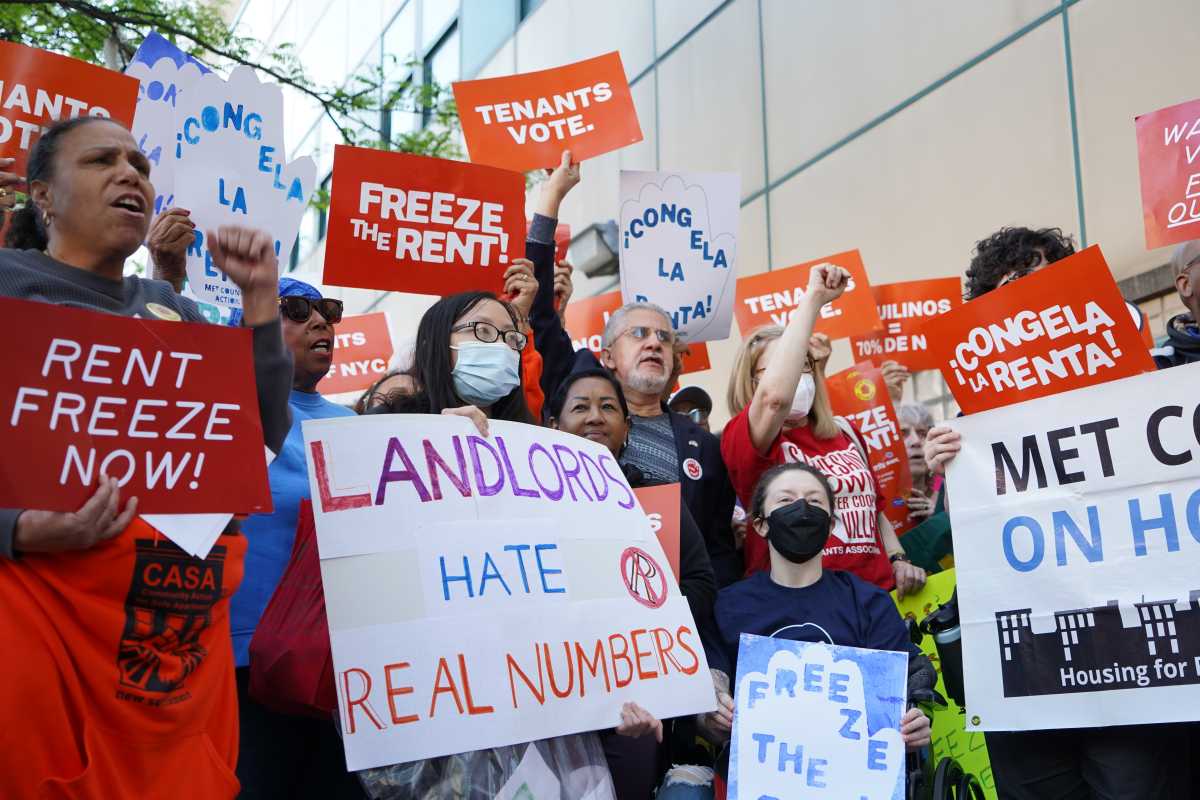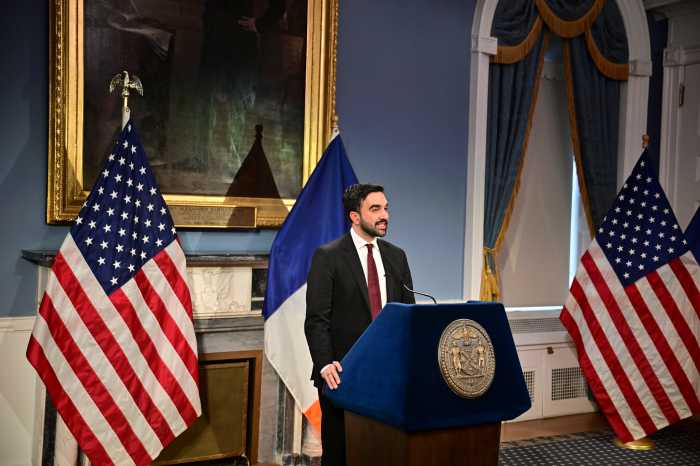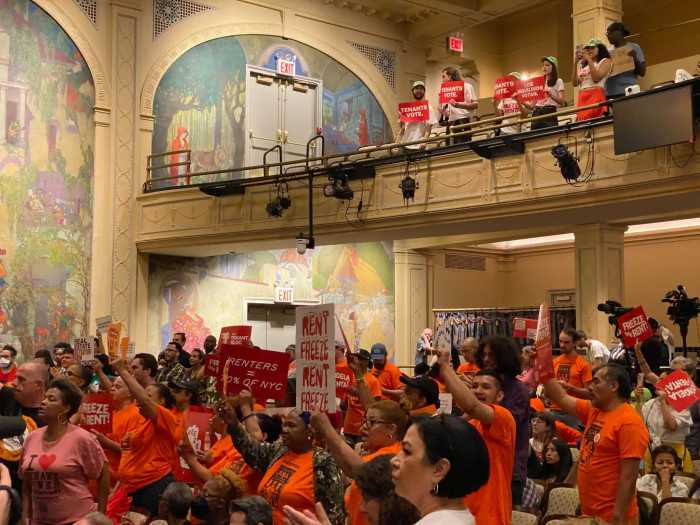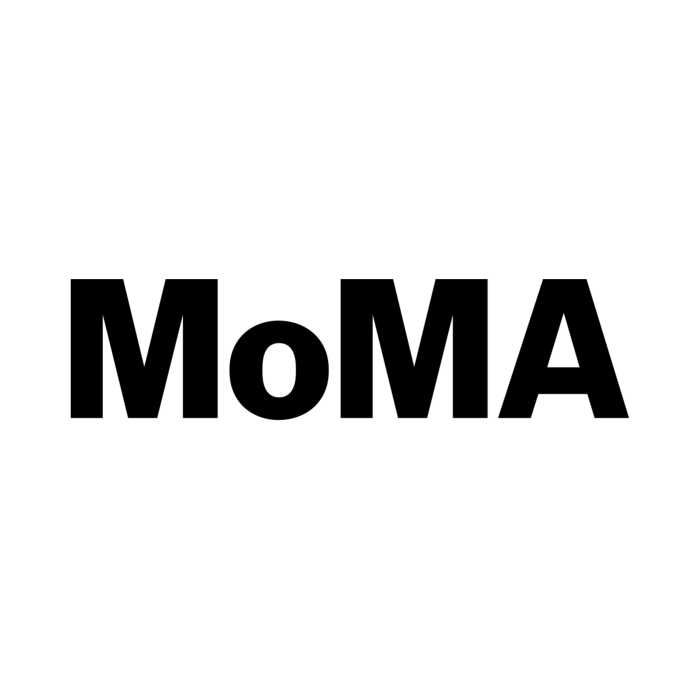The New York City Rent Guidelines Board’s preliminary vote on Wednesday to raise rents for roughly one million rent-stabilized units has drawn swift criticism from tenant advocates who say the move will worsen the city’s affordability crisis.
The board voted 5-4 Wednesday night to propose rent increases of 1.75% to 4.75% for one-year leases and 4.75% to 7.75% for two-year leases, affecting leases beginning Oct. 1, 2025.
The vote is preliminary, and the final decision will be made in late June. However, the final increases have historically fallen within the preliminary ranges.
Protesters with the New York State Tenant Bloc rallied outside the LaGuardia Performing Arts Center in Long Island City, Queens ahead of the vote and interrupted the meeting with chants calling for a full rent freeze.
During the raucous meeting, tenant board members Adán Soltren and Genesis Aquino proposed a 0% to 1.75% increase for one-year leases and 0% to 3.75% for two-year leases. Meanwhile, landlord-aligned members pushed for higher increases — 6% to 8% on one-year leases and 8% to 9% on two-year leases – arguing rent hikes are necessary to cover maintenance costs, especially for distressed properties.
The tenant reps both reiterated their opposition to any increase after the meeting.
“I’m utterly disappointed and angered that the Board is about to raise rents on millions of New Yorkers for the fifth year in a row and not consider a much-needed rent freeze. The Board has made clear that they do not care about the historical abuses and overcompensation of landlords, and instead are choosing to prioritize landlords’ alleged needs, and preserve landlords’ profits, rather than preserve hardworking New Yorkers’ homes and stability,” said Soltren.
Aquino, also executive director of Tenants and Neighbors, said the vote showed tenants must “build our own power” in response to rising displacement and unaffordable rents.
The Real Estate Board of New York praised the proposed hikes, calling them “meaningful assistance to rent-stabilized housing, upon which over two million New Yorkers rely.”
“RGB’s own data shows increasing financial challenges and much more investment is needed in these aging buildings to preserve their long-term quality and availability,” Henry Perez-Tlatenchi, senior data and policy researcher at REBNY, told amNewYork.

Tenant advocates argue that rising rents will deepen the housing crisis, citing data that claims a rent freeze would save New Yorkers an average of nearly $600 a month. Landlords, however, say increases are necessary to offset rising costs and property distress.
One report considered by the RGB shows that landlord operating costs for rent-stabilized buildings rose by 6.3% over the past year. The Small Property Owners of New York (SPONY), representing building owners with 20 units or less, said the at based on this assessment, the RGB is falling short of reflecting its own data with the current preliminary rent hike proposal.
“The RGB must now take bold action, departing from its preliminary range and setting higher rent increases,” said Ann Korchak, board president of SPONY, arguing that small property owners rely on rent adjustments that keep pace with rising expenses such as taxes, insurance, utilities, and maintenance.
The vote has emerged as a flashpoint in the 2025 mayoral race. Several Democratic candidates, including Queens Assembly Member Zohran Mamdani, who joined Wednesday’s protest, have backed a rent freeze.
“It does not make sense to anyone but the landlords of those units,” Mamdani said while addressing the crowd outside the meeting. “The ranges that have been put forward today, though they may be described as preliminary, these are the ranges that they will make their final decisions from, and neither of these ranges include a rent freeze. … And when they increase the rent, they will push New Yorkers out of their homes.”
Critics also targeted Mayor Eric Adams, who appoints the board’s nine members, accusing him of favoring real estate interests.
Adams’ appointees – two landlord representatives, two tenant reps and five public reps – have supported rent hikes in each of the past three years, including increases of 2.75% for one-year leases last year and 3% the year before.
“No one’s home should be reduced to a bottom line, but that’s what Mayor Adams’ RGB does. It puts profit above people. Freezing the rent for the 2.4 million rent-stabilized New Yorkers is a common-sense first step to providing tenants relief from skyrocketing rent prices,” said Andrea Shapiro of Met Council Action and co-chair of the Freeze the Rent Campaign.
In a statement after the vote, Adams said the proposed 7.75% increase may be “too unreasonable,” but failed to say what a reasonable hike would look like. He defended the board’s independence and pointed to his administration’s broader efforts to address the housing shortage through zoning reforms and housing development.
“We know our housing crisis requires a wider range of tools than the Rent Guidelines Board vote provides,” Adams said, who on the campaign trail has not committed to a rent freeze but instead challenged his rivals to pair their proposals with plans to protect small landlords from taking a financial hit.
The board will hold four public hearings before a final vote, the first of which is scheduled for May 22 in Manhattan.






































